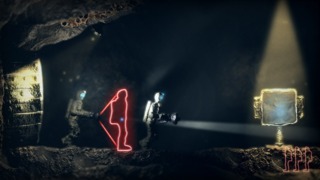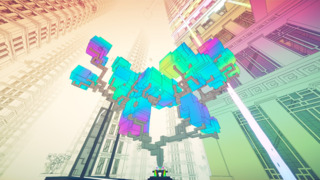Perspective Skew: Why Puzzle Games Bend Reality
By gamer_152 0 Comments

Over the last decade and a half, the breakout stars of the puzzle genre have tended to be those titles that stun on sight. The showmen with core mechanics you can understand from the briefest flash, but that bend both reality and your mind. There is the Lego rule-rewriting of Baba Is You, self-cloning in The Swapper, the subjective resizing of objects in Superliminal, the time loops of Outer Wilds, you know the sort of thing. Not all puzzle games twist one of the fundamental axioms of our reality. The Witness is one of the best-acclaimed brainteasers of all time, and that's a catalogue of Buddhist placemat mazes, but experiences like The Witness are the exception rather than the rule.

It's curious because you don't see other fields of gaming relitigating the contract between player and environment as a default. Horizon: Forbidden West doesn't have you going back in time to reconsider how you might play the game every 20 minutes; in Baldur's Gate 3, perception is not reality; in Red Dead Redemption 2, you can't reprogram your horse. Not yet, at least. I don't want you to go away with the idea that strategy or action games are not worth your time because they aren't remixing their shit for every session. The takeaway should be the opposite: that they don't need to. Most games can keep a relatively consistent and shared notion of what reality looks like and still scintillate. And that leaves me asking: Why do so many successful puzzle games keep breaking the laws of nature when their friends in other formats don't?
The split goes back to what we're looking for from each gameplay genre and how each style of game generates challenge. When the draw of a gameplay section is its feel, it will stand up to replays because the pleasant sensations are there every time you return to it. You can also generally repeat hand-eye coordination courses in games without boredom. This is because having been able to contort your hands into the correct shapes at the correct times once does not mean you can do it again. The difficulty stands its ground.

Most experiences with games are also part scripted challenge and part procedurally-generated obstacles. Stages may have fixed objectives or layouts, but branch conditions and random elements, including AI behaviour, mean that you can play the same level multiple times, and it won't react to you the same way twice. The vendor's selection of items on the third floor will keep rotating, an enemy that may have dived right to escape a grenade once could dive left the next time. Not to mention, you exert a sway in how levels play out. Your behaviour changes with improvements in your skills, and designers offer choices to let you express yourself and take ownership of the experience.
Some puzzle games also allow for relatively freeform solutions to levels. You can see it in entertainment where we're building a solution rather than finding one, such as World of Goo or Space Engineers. It's further present in match-three games like Zuma or Royal Match. But a galaxy of puzzles exists outside of the match-three and systems construction genres. In the adventure, action-adventure, or environmental archetypes, we rarely get the same wiggle room for forming solutions that we do in match-three and systems construction games. And environmental puzzle games are in vogue. One may offer an alternative solution now and then, but sections in, say, Phantasmagoria or LEGO Builder's Journey are not open problems. They do not agree with the large majority of solutions we could offer and will not change their shape on replays.

With rigid rules, we know that if we've collected information about a puzzle once, we'll be able to apply it in the future to reach success. More than that, having a narrow band of valid solutions makes us put our thinking cap on when taking action. Because the locks of environmental puzzle games will not bend to fit your key, you need to seek a specific key instead of lazily picking one from the ring. And it's diligent deduction that makes us feel smart.
For puzzles that have very few answers or one answer, it follows that if the player beats it, they know the required steps for it, and the level can no longer offer the emotional reward for solving a mystery. You can't be tasked with finding the key if you're already holding it. Unlike levels in an action game, puzzle stages also rarely occupy you with hand-eye coordination tests or use stimulating game feel as a design pillar. Therefore, they have limited replay value. I am compartmentalising here; games often engage along multiple vectors simultaneously. Appeal through action, puzzles, and sensory attractions are not mutually exclusive, so some puzzle games retain charm even across concurrent playthroughs. Plus, over a long enough timespan, players will forget the steps to complete puzzles, opening those levels up to get their mental gears whirring again.

Still, environmental puzzles rely on audiences lacking an understanding of how to solve them out of the gate. Therefore, if they only employ the logic of the real world or other puzzle gauntlets, the player may already know how to steer that logic to solve the story mode's problems. If you keep setting the player the same puzzles across multiple games, they arrive with all the knowledge they need to bore themselves to death. But suppose the player finds that time, space, size, or other aspects of the game world do not operate like that of any world they are familiar with. That they can clone themselves, spontaneously grow and shrink objects, or teleport. There is now new logic to be unravelled. The player must commit to a lot of induction and deduction to manipulate the systems in the direction they'd like.
Players become perpetual tutees, always refreshing their mindset, thinking outside the box to succeed at exams. The complementary aesthetic to that twisting of our worldview is a warping of reality. Mechanics like carrying universes in our hands in Cocoon or the infinitely tiling world of Manifold Garden don't just embody a mechanical aesthetic but also influence how their respective games look and sound.

When puzzlers have a perspective skew or hook mechanic, the word "gimmick" is inevitably thrown in their face. But by definition, gimmicks are superficial. Like sparklers, they fizzle brightly for a little while and then burn out. Yet, most sensational puzzle games need play and aesthetics that can support a multi-hour story mode at the very least. Their single-player tests the depth of their mechanical premises. The worst puzzle games burn down to their base in no time, but the best produce hours of thought-provoking trials capable of changing how we see virtual worlds and our physical one, too. Thanks for reading.